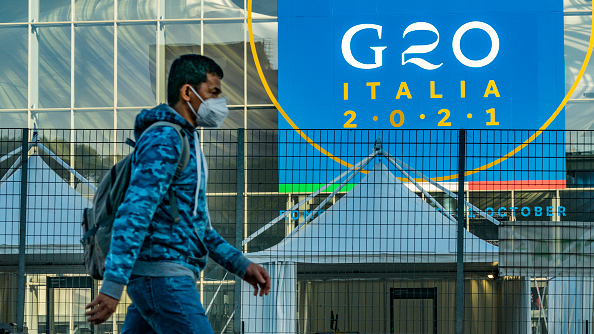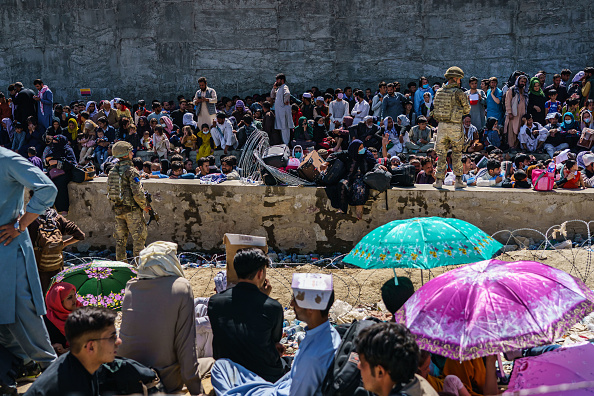
A man walks under a huge banner announcing the G20 Summit on the glass wall of the Nuvola Congress Center in Roma, Italy, October 27, 2021. /Getty
A man walks under a huge banner announcing the G20 Summit on the glass wall of the Nuvola Congress Center in Roma, Italy, October 27, 2021. /Getty
Editor's note: Anthony Moretti is an associate professor in the Department of Communication and Organizational Leadership, Robert Morris University. The article reflects the author's views and not necessarily those of CGTN.
Over the next few days, there will be nonstop international attention on the G20 summit in Rome. As you might guess, there will be plenty of conversation about the coronavirus pandemic, which many Western nations remain unable to knockout.
One initiative that will draw significant interest and conversation — and likely to be roundly accepted by the Western media — is the idea hatched by the third G20 Finance Ministers and Central Bank Governors meeting in July, where the officials called for the establishment of a Global Health Threats Board, which will lead the effort to assist all nations in fighting the current pandemic and any future health calamities. The plan also seeks the creation of a global health fund that would be earmarked especially for low- and middle-income countries so that they will have more resources to combat future health crises, no matter when they arrive.
Just this week, Janet Yellen, the United States Secretary of the Treasury, called on the U.S. and other Western countries to rally around the potential fund, which is expected to be discussed in depth at the G20 meeting.
According to Secretary Yellen, the global financial crisis that began in 2008 "exposed a need to strengthen international economic cooperation and led to the designation of the G20 as the premier forum for such cooperation. Similarly, the current pandemic revealed a lack of readiness at the country level and a lack of coordination among us. For this reason, we strongly support launching a forum where health and finance ministers could begin the work of facilitating global cooperation and coordinating prevention, detection, information sharing and, if needed, response."
The rhetoric appears to make perfect sense: The world's richest countries should do what it takes to ensure that they and their less well-off neighbors have a coordinated plan and deep financial pockets to combat this pandemic and any future health disasters.
It is troubling that Secretary Yellen referenced the global financial crisis as a valuable example for deep international coordination now. That calamity exposed the terrible oversight that U.S. political, business and media leaders offered the financial industry. A lust to get rich and put people into homes which they could not afford nearly caused international finance to collapse.
What confidence should you or I have that the U.S. would do a better job as a pivotal player in a global fight against the pandemic? The staggering COVID-19 death toll and case count in the U.S. should give all of us pause before we support placing the U.S. in that kind of leadership position. Moreover, why should we not question whether America's allies would attempt to advance their own international agendas while combating the pandemic?
A ridiculous and unfair criticism, you say? Then please explain the two-decade failed effort to force Western political, economic and social norms in Iraq and Afghanistan.

Inside Abbey Gate, American and British security forces maintain order among the Afghan evacuees waiting to leave in Kabul, Afghanistan, August 25, 2021. /Getty
Inside Abbey Gate, American and British security forces maintain order among the Afghan evacuees waiting to leave in Kabul, Afghanistan, August 25, 2021. /Getty
Let us also not forget that the West has consistently demanded another WHO-led investigation into what (might have) happened at the Wuhan Institute of Virology throughout 2019. With U.S. President Joe Biden banging the drum the loudest, the WHO appears to be listening. It seems ready to undertake that second study. Western media have aided their governments' calls for further inquiry, with Danish television and American newspapers offering unending criticism suggesting that China stops at nothing in covering up any embarrassing facts about the coronavirus outbreak.
It is important to remember what the initial investigation determined: Investigators concluded it was "extremely unlikely" that a so-called lab leak caused the outbreak.
Therefore, we must be skeptical when the West contends that the WHO will act with the autonomy necessary to carry out any massively funded effort to aid nations in fighting current and future pandemics.
To no one's surprise, China has adopted a position similar to this. Just last week, Zhao Lijian, China's foreign ministry spokesman, said China "firmly supports strengthening global governance system, enhancing the leadership and coordination of the WHO and improving anti-pandemic financing cooperation."
UN Secretary-General Antonio Guterres' "Our Common Agenda" report has challenged the international community to acknowledge that crises such as climate change and pandemic preparation need immediate attention. He is correct to suggest that "a breakdown or a breakthrough" are the stark choices facing all of humanity. But one must carefully consider whether throwing more money at a solution is the right thing to do. And perhaps more importantly, careful consideration must be given to deciding whether we should choose the West to supervise and evaluate it.
(If you want to contribute and have specific expertise, please contact us at opinions@cgtn.com.)

